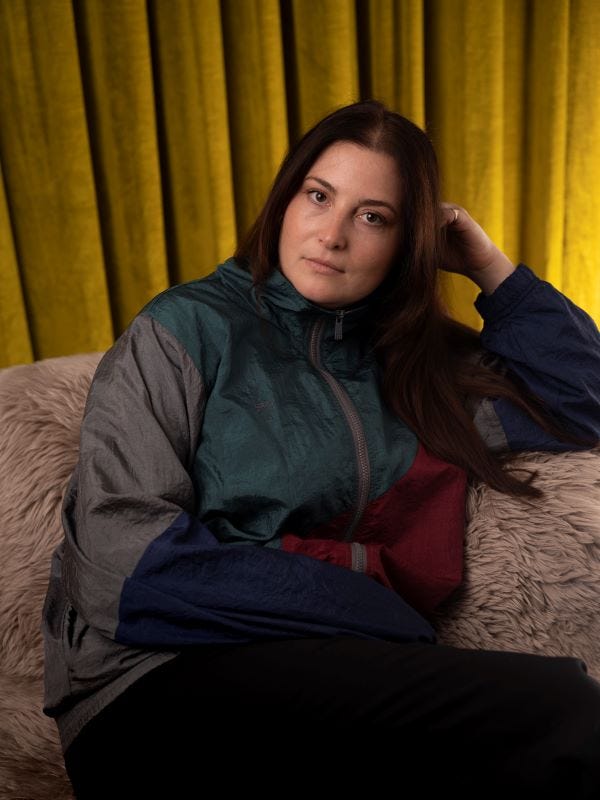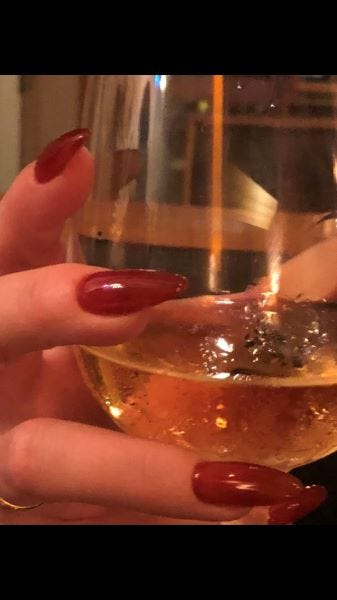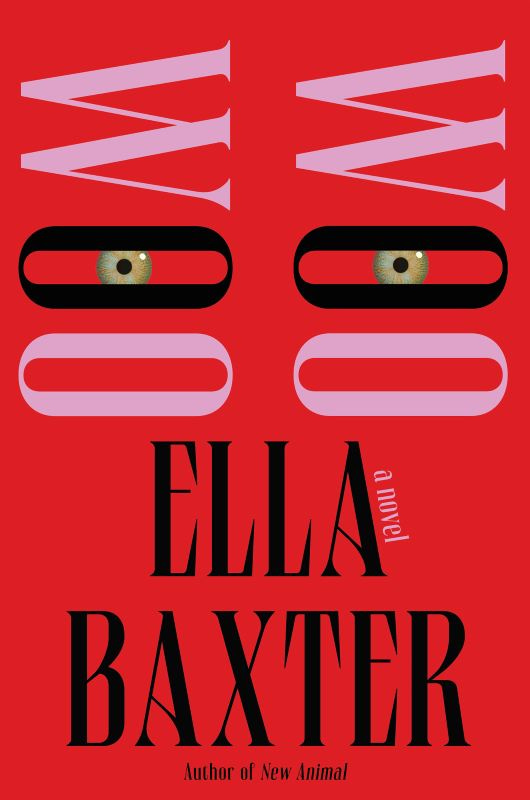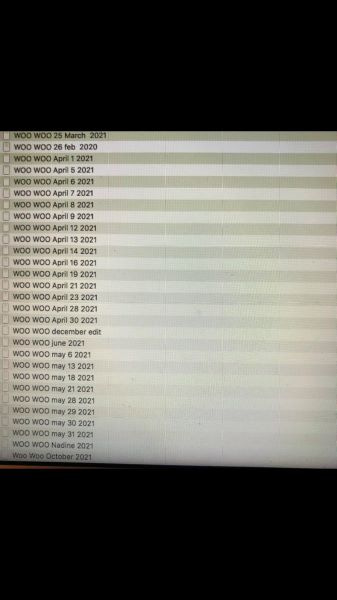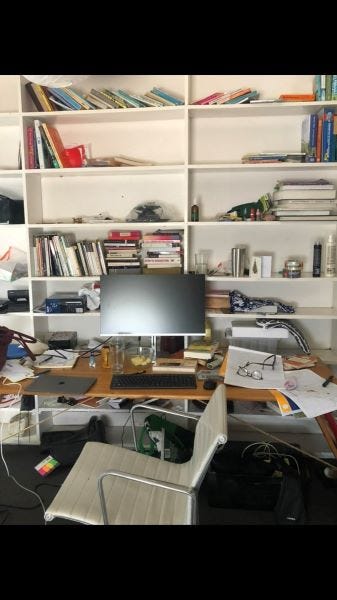I Want a Book to Read Like a Punch in the Face
Book Talk with Ella Baxter: the muse, anglerfish, spells
Sabine is on the brink of something: artistic brilliance, collapse, a breakthrough. Preparing for a blockbuster exhibit at a gallery in Melbourne, she encounters a stalker who lurks menacingly outside her home. As Sabine confronts the horrors that the stalker brings into her life, she discovers new depths inside of herself, in the process creating work she’s never dreamed of before.
For fans of Tár and Velvet Buzzsaw, Woo Woo is at once a searing critique of the art world and a gripping story of rage and how one woman experiences art in her body. The novel asks smart questions about artistic process, celebrity, and the parasocial relationships we develop with cultural icons.
Ella Baxter is a writer and artist living in Melbourne, Australia. Her debut novel, New Animal, garnered accolades in Australia, the United States, and Canada. We spoke about performance art, fury narratives, and courting darkness.
Woo Woo is out Tuesday. How are you feeling about book two going out there?
Yeah, I feel really weird, to be honest. I'm doing a lot of walking, like a two hour walk every day, just to process my feelings. When I wrote Woo Woo, I really did not write it for anyone except my stalker. It's already come out here in Australia, and I had that feeling of vulnerability and wild energy, and I feel like it's building again for the U.S. release, so it's just a bit freaky. It's the first piece of art or work I've ever made with a very clear intention, and I think that can be a bit freaky.
I'd love to hear about that intention as it contrasts with writing it for someone. How did you understand those two things alongside each other?
I think Woo Woo saved my life in lots of ways. I was being stalked, and I was sent anonymously these awful threatening letters by someone who clearly knew a lot of details about my life. For almost a year, it ruined my life. I was getting really worried that this person was going to attack. I wasn't sure what the end game of it was. It felt like they were just trying to terrify me, and that was the thrill for them. The police didn't help. I went to stalking experts. I went to a psychic. Nothing was really helping, and then my friend told me to write a letter back, just as an experiment in agency. As soon as I began the letter, it was the most powerful I've ever felt in my life. It was so beautiful to address them back and to meet them in this really dark space that they had created, and to bring my own darkness with me. And so that's what Woo Woo was.
First off, I'm sorry to hear that you went through that—that sounds truly terrible.
I want to talk about the dark places the book goes, but first, I'm curious what got you interested in writing about performance art.
I trained as a contemporary dancer in my late teens, early 20s. I have a degree in contemporary dance, and a lot of the contemporary dance I was drawn to back then was on the cusp of performance art. There's actually a lot of overlap in contemporary dance and performance art, and, in a way, an anti-art movement. I really love bodies being art. I love the performer transforming into the art and then transforming back. It's always been a fascination of mine.
Around the time I was writing the letter back to the stalker—the very original version of Woo Woo—I was also looking at lot of art by Ana Mendieta and her Silueta series. I was searching for art that felt like a spell, and a lot of the art that came up was performance art, Marina Abramović, all these really intense women who had just held such space, and I was kind of addicted to it.
There’s so much focus on process in the book. What narratives—books, movies, public discourse on art and artists—piqued your interest?
I think because I have been a visual artist—I've stopped briefly for the moment because I had a baby and it's just too hard—I've always been really obsessed with the art world. There was a really young painter, Anna Weyant, and she was dating the 78 year old Larry Gagosian. I follow even the tabloid art trash news. I'm just obsessed with the art world generally: the banana taped to the wall, I look at Christie's auctions, I like all the paraphernalia surrounding the art world. There's so much pomp and ceremony that is really entertaining.
The critique of it is so fun.
Oh, 100%. I read an interview with this emerging artist the other day, and slowly it came out that they were completely bankrolled by their parents, and that they were outsourcing their art making to China, and they were running all the best shows in New York for a time period. That, to me, is a novel. You could write that as a novel, and it would be so fascinating. It's just nuts.
Yeah, that's so funny. There's so much mystique behind artists—there’s something fetishistic about how people talk about artists or the process. The satire in the book takes that down.
But it’s weird too. I went to one gallery in Melbourne, and the gallerist was wearing a leather beret. You can't write it. Literally, she chose to wear it. She looked amazing, and it was so chic in that context, but a leather beret is quite a ridiculous garment too. It’s this whole thing that in situ makes sense, but taken out of that, it's wacky as hell. I'm obsessed with it. I love it.
Sabine’s process gets darker, more involved, and bodily through the book. There’s this feeling of being bewitched by the process. How do you feel that language around process—being bewitched by the act of creation?
I think the act of creation is a very deep, symbiotic relationship with the muse. I believe in the muse. It's like my God, and so I feel like there's certain things I need to do to welcome the muse in. There's certain things I need to do to court the muse to come to me. I am waiting every day of my life for the muse to talk to me. Separate to anything I make, it is a daily thing I'm trying to get going. With writing Woo Woo, I think the shock of the work was that the muse was in my ear very clearly. I felt really connected to that source, I think because I was so willing to go really dark with it. The earlier versions were much darker than the current version.
It was honestly the best process of my life. I've never made anything before that I felt so connected to and so in awe of that relationship—I'm not in awe of my work. I'm in awe of that dialogue.
I thought of the book as a fury narrative or a fugue state. You talked about accessing this darkness in the book and in your own experience. What did it feel like to write into that darkness?
I'll say in hindsight, I think it's something you should visit but not linger in. As an artist, I feel like it's important to go to those depths I hadn't before. Afterwards, I thought, “Oh, it's a real shame I haven't mined these darker parts because they are so rich for creative work.”
For me, spurring on that energy was the fact I'd been so frightened for so long that as soon as I started to feel any agency or power, which I began to feel once I started writing the letter back, it was addictive. I just wanted more and more. There was a part of me that had been dormant, and it rose to the top. It was this part that was essentially saying to this person, “You don't know what I'm capable of. You've picked me as your victim, but there's something that is very unwilling to be a victim inside me.” I don't think they foresaw that happening. Even the fact I've published this book, and in every interview I've talked about this relationship with the stalker that was supposed to be private and something that terrified me in secret—I think I have subverted what they thought I was going to do, and I really have enjoyed that.
As an artist, I feel like it's important to go to those depths I hadn't before.
Without giving anything away, one of my favorite images from the book is the anglerfish. It feels connected to reclaiming power and subverting expectations—how did that come to you?
Alongside writing Woo Woo, my marriage was falling apart. As well as writing this book, I was looking at images and works that would help me understand my current relationship and what was happening. I was looking at, I think, monogamy in the animal kingdom. I'd Googled something and gone on lots of different clicks and then I found this anglerfish. The way they've evolved to connect essentially ruins both of them, and I was like, that's fucking marriage. It clicked in that moment for me. That's a very bleak view, but I saw it so perfectly as an analogy. You give so much of yourself physically, emotionally, spiritually, but in the end, you've just become this one piece of flesh that is not really functional as two anymore.
I also feel like as a creative person, it's really hard to maintain an intimate relationship and also be completely present for your work. It's like the two draw from the same source, and it's hard to split it evenly, or negotiate that constantly. Basically every creative person I know really struggles with that.
Yeah, especially when you put two creative people together, like Sabine and Constantine.
How do you find the local literary and arts scene in Melbourne? Does that support or complicate the work for you?
I have a lot of dear friends who are writers, and I adore them, but I find the networking and events quite laborious. I don't know. It seems to require a social prowess that I just don't possess. I think I try and stay away. To be honest, I am the best when I disengage from every single thing and just focus on my work, so that's how I try and live.
I really appreciate you sharing that—I’m always interested in people’s relationship to the production of art and some of the bullshit around it.
There’s so much bullshit. It's that thing where you might be talking to someone, but they're scanning the room behind you for someone more important to talk to. The literary world in Melbourne is quite small. Australians are weird—if they think you're getting too much attention, they just won't acknowledge you. I definitely enjoyed it more before I had published any work. Those things were fun when I had nothing.
I am the best when I disengage from every single thing and just focus on my work, so that's how I try and live.
We've talked a lot about art. Is there anything else that's exciting to you in fiction or your reading right now?
I just finished Liars by Sarah Manguso, and I felt like I wanted to throw that book at the wall a handful of times because it was so fucking raw and good, and I was in awe of her vulnerability in writing it. That excited me—the way that a writer was so willing to cut herself open for fiction. I thought that was magnificent.
I'm going through a reading slump, to be honest. This is going to sound wrong, but every book reads like a book, and I want a book to read like a revolution or a punch in the face. I don't want to read a book. I want to be fundamentally, seismically shifted, and I'm just sick of reading books that are books.
I keep saying Carmen Maria Machado’s In the Dream House—that was groundbreaking. She changed the structure of the book. She moved all fences back, and I feel like that is exciting. That is the literature I want in my blood.
I don't want to read a book. I want to be fundamentally, seismically shifted.
Same with I Love Dick by Chris Kraus. That's one of my favorite novels as well. I love it. Same thing—really happy to go into the dirt of an idea and sift through it slowly and not be rushed into the novel form, just to sit in that space, regardless of whether it's entertaining for the reader. It actually is so entertaining because they've gone to that space with you, holding your hand.
Order Woo Woo and find more of Ella’s work here.
Reference Section
Currently reading: I’m on vacation this week and brought with me Keziah Weir’s The Mythmakers and Bret Easton Ellis’s The Shards for a reread.
Note: I earn a small commission when you shop for books through my Bookshop links, and I appreciate your support, which helps keep Referential free.


